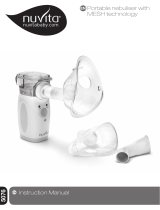
4
4. Important Safety Notes -1
(Risk of electrical shock)
• The compressor nebuliser is not waterproof. Do not spill water, or other liquids on these
parts. If liquid does spill on these parts, immediately unplug the USB and wipe off the
liquid with gauze or other absorbent material.
• Do not immerse the compressor (main unit) in water or other liquid.
• Do not use or store the device in humid locations, such as a bathroom.
• USB must comply with the standard of IEC 60601-1, which provide 2 MOPP.
(Cleaning and disinfecting)
Observe the rules below when cleaning or disinfecting parts. Failure to observe these
rules may result in damage, inefficient nebulisation or infection. For the instructions,
refer to “Cleaning and disinfecting” section.
• Clean and disinfect the nebuliser kit, mask, or mouthpiece before using them
when as follows:
--the first time after purchase.
--the device has not been used for a long period of time.
--more than one person uses the same device.
• Be sure to wash or wipe the parts after use, and ensure that they are thoroughly
disinfected and dried, and stored in a clean location.
• Do not leave the cleaning solution in the parts.
Caution
Indicate a potentially hazardous situation which, if not avoided, may result in minor or
moderate injury, or physical damage.
• Provide close supervision when the device is used by, on, or near children and the
physically incapable.
• Make sure that the parts are attached correctly.
• Make sure that the air filter is correctly attached.
• Make sure that the air filter is clean. If the air filter has changed colour, or has been
used on average for more than 60 days, replace it with a new one.
• Do not spill liquid or medication on the compressor.
• Do not tilt the nebuliser kit at an angle of greater than 45 degrees in all directions, or
shake it while in use.
• Do not use or store the device while the air tube is creased.
• Use only original nebulising parts, air tube, air filter and air filter cover.
• Do not add more than 10 ml of medication to the medication tank.





















